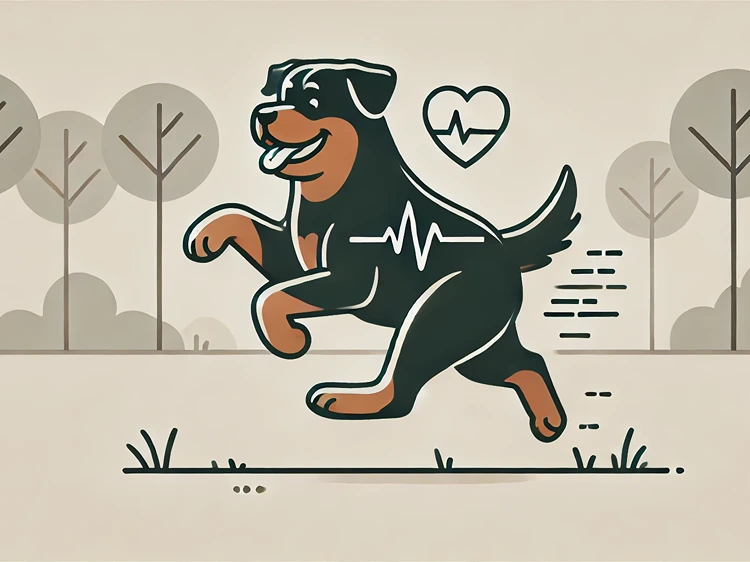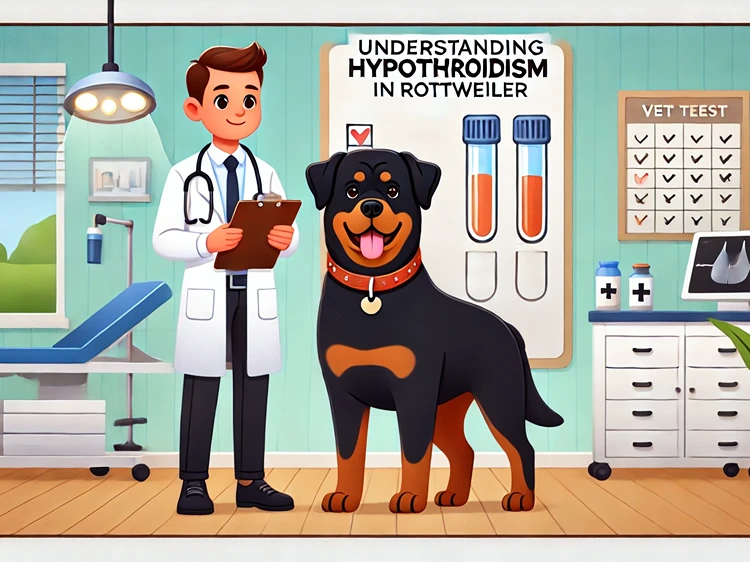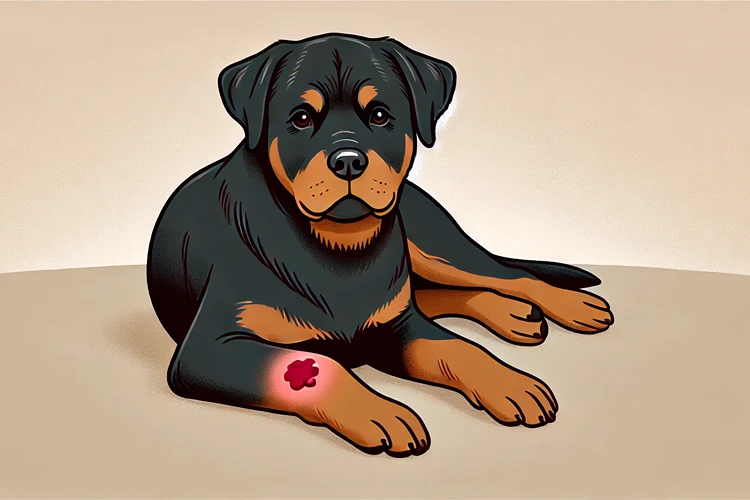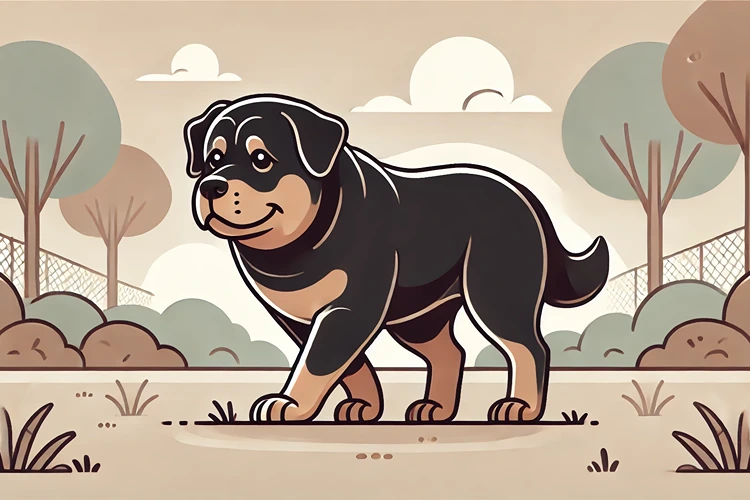Rottweilers are known for their strength, loyalty, and protective nature. But behind that robust exterior, they can face serious health challenges, especially when it comes to their heart. Understanding the early signs of cardiovascular issues in Rottweilers is crucial for every owner. By staying informed, you can take proactive steps to ensure your Rottweiler lives a long and healthy life.
Why Is Rottweiler Heart Health So Important?
Rottweilers are predisposed to certain heart conditions due to their size and genetics. Large breed dogs, like Rottweilers, have a higher risk of developing cardiovascular problems as they age. This makes it essential for owners to keep a close eye on their Rottweiler’s heart health, starting from a young age. Early detection of heart issues can make a significant difference in the outcome, often leading to better treatment options and an improved quality of life for your furry friend.
Paw-some Tip:
Regular veterinary check-ups are crucial for monitoring your Rottweiler’s heart health. Don’t skip those annual visits, as they can catch issues early, before they become more serious.
Common Heart Conditions in Rottweilers
Rottweilers can be prone to several heart conditions, each with its own set of symptoms and risks. Here’s a closer look at some of the most common ones:
What is Dilated Cardiomyopathy (DCM)?
Dilated Cardiomyopathy, often referred to as DCM, is a condition where the heart’s ability to pump blood decreases because the heart muscle is enlarged and weakened. This is particularly common in larger breeds like Rottweilers. Symptoms of DCM can be subtle at first, but they tend to worsen over time.
How Can Aortic Stenosis Affect Rottweilers?
Aortic stenosis is another condition that Rottweilers are susceptible to. It involves the narrowing of the aortic valve, which makes it harder for the heart to pump blood to the rest of the body. This condition can be hereditary, so knowing your Rottweiler’s family history can be beneficial.
Mitral Valve Disease in Rottweilers
Mitral Valve Disease affects the heart’s mitral valve, leading to blood leaking back into the atrium, which can cause heart enlargement and eventually heart failure. Although this is more common in smaller breeds, Rottweilers are not immune to it, and it’s something to be aware of.
Rottie Stats:
Studies suggest that large breeds, including Rottweilers, are up to three times more likely to develop heart conditions like DCM compared to smaller breeds. Early detection is key to managing these conditions effectively.
Early Signs of Cardiovascular Issues in Rottweilers
Recognizing the early signs of heart problems in your Rottweiler can be challenging, but it’s essential. The sooner you notice something is off, the sooner you can get your Rottie the help they need. Here are some signs to watch out for:
- Coughing: Persistent coughing, especially after exercise, can be a sign of heart trouble. It’s often mistaken for a respiratory issue, but if it persists, it’s worth getting checked out.
- Fatigue: If your Rottweiler seems more tired than usual, especially during or after exercise, it could be due to poor blood circulation caused by heart disease.
- Difficulty Breathing: Labored breathing or shortness of breath, even when at rest, can indicate that your Rottie’s heart is struggling.
- Fainting or Collapsing: These are severe symptoms that require immediate veterinary attention, as they can indicate a significant heart issue.
- Swollen Abdomen: This can be a sign of fluid buildup due to heart failure, often referred to as ascites.
How Does Weight Gain Impact Rottweiler Heart Health?
Sudden weight gain, especially if it’s not related to changes in diet, can indicate fluid retention, which is a common symptom of heart disease. If your Rottweiler is gaining weight rapidly without a clear cause, it’s time for a vet visit.
Behavioral Changes: Should You Be Concerned?
Rottweilers are known for their energy and playfulness. If you notice your dog becoming more lethargic, withdrawn, or showing a lack of interest in activities they usually enjoy, it could be a sign that something is wrong with their heart. Behavioral changes are often the first indication that something is amiss, so don’t ignore them.
Paw-some Tip:
Keep a journal of your Rottweiler’s daily habits, including their energy levels, appetite, and any symptoms like coughing or difficulty breathing. This record can be invaluable to your vet when diagnosing potential heart issues.
Heart Condition Symptoms vs. Common Dog Ailments
| Symptom | Heart Condition | Common Dog Ailment |
|---|---|---|
| Coughing | Heart disease, fluid buildup in lungs | Respiratory infection, kennel cough |
| Fatigue | Poor blood circulation due to heart failure | General tiredness, lack of exercise |
| Weight Gain | Fluid retention from heart disease | Overfeeding, hypothyroidism |
| Difficulty Breathing | Heart failure, fluid in lungs | Allergic reaction, asthma |
How Are Heart Conditions Diagnosed in Rottweilers?
When it comes to diagnosing heart conditions in Rottweilers, your veterinarian will rely on a combination of clinical signs, physical exams, and specialized tests. Understanding the diagnostic process can help you feel more prepared if your Rottweiler shows signs of cardiovascular issues.
What to Expect During a Physical Exam?
During a physical exam, your vet will listen to your Rottweiler’s heart using a stethoscope. They’re checking for any abnormal heart sounds, like murmurs, which could indicate issues like DCM or mitral valve disease. They’ll also check for any signs of fluid buildup, such as in the abdomen or lungs, which can suggest heart failure.
Understanding the Role of an Echocardiogram
An echocardiogram is an ultrasound of the heart, and it’s one of the most effective tools for diagnosing heart problems in dogs. This non-invasive test allows the vet to see the heart’s structure and function in real-time, helping to identify conditions like DCM or valve diseases. If your Rottweiler is showing signs of heart issues, your vet might recommend this test to get a clear picture of what’s happening.
How Does an Electrocardiogram (ECG) Help?
An ECG measures the electrical activity of your Rottweiler’s heart. It’s useful for detecting irregular heart rhythms, which can be a sign of underlying heart disease. The test is quick and painless, making it a common diagnostic tool if a heart condition is suspected.
Blood Tests: What Can They Reveal?
Blood tests can provide important clues about your Rottweiler’s heart health. For instance, high levels of certain biomarkers, like NT-proBNP, can indicate heart disease. These tests are often used in conjunction with other diagnostics to get a complete picture of your dog’s heart condition.
Rottie Stats:
Studies show that early detection and treatment of heart disease in dogs can extend their lifespan by up to 25%. Regular check-ups and diagnostic tests are key to catching issues before they become life-threatening.
Treatment Options for Rottweiler Heart Conditions
Once a heart condition is diagnosed in your Rottweiler, your vet will discuss treatment options. These can vary depending on the severity of the condition and your dog’s overall health. Here’s a look at some common treatments for heart disease in Rottweilers.
Medications: What Can They Do?
Medications are often the first line of defense against heart disease. They can help manage symptoms, improve heart function, and slow the progression of the disease. Common medications include ACE inhibitors, diuretics, and beta-blockers. Your vet will determine the best combination of medications based on your Rottweiler’s specific condition.
How Does Diet Play a Role in Managing Heart Disease?
Diet is crucial in managing heart disease in Rottweilers. A low-sodium diet can help reduce fluid retention and ease the workload on your dog’s heart. Additionally, certain supplements, like omega-3 fatty acids, may support heart health. Your vet might recommend a special diet tailored to your dog’s needs.
Monitoring and Follow-up Care
After starting treatment, regular monitoring is essential to ensure that your Rottweiler’s heart condition is under control. This might include follow-up visits, repeat tests, and adjustments to their medication regimen. Keeping a close eye on your dog’s symptoms and communicating with your vet is key to managing heart disease effectively.
Paw-some Tip:
Stick to the treatment plan and attend all follow-up appointments. Heart conditions require ongoing management, and your diligence can make a significant difference in your Rottweiler’s quality of life.
Prevention Strategies for Rottweiler Heart Health
While not all heart conditions can be prevented, there are steps you can take to reduce your Rottweiler’s risk. Prevention is always better than cure, and focusing on heart health early on can help your dog avoid serious issues down the line.
Why Is Regular Exercise Important?
Regular exercise helps maintain a healthy weight and supports cardiovascular health. For Rottweilers, daily walks and playtime are essential. However, it’s important to balance activity levels, especially as your dog ages, to avoid putting too much strain on their heart.
The Role of a Balanced Diet
A balanced diet rich in nutrients supports overall health, including the heart. Feeding your Rottweiler a high-quality dog food with the right balance of protein, fats, and carbohydrates is vital. Avoiding foods high in sodium is also crucial for heart health, particularly as your dog gets older.
Why Are Regular Vet Visits Crucial?
Regular vet visits are your best defense against heart disease. These check-ups allow your vet to monitor your Rottweiler’s heart health and catch any early signs of trouble. Blood tests, heart monitoring, and physical exams are all part of a proactive approach to keeping your dog’s heart in top shape.
Genetic Testing: Is It Worth It?
Because some heart conditions are hereditary, genetic testing can be a valuable tool. Knowing if your Rottweiler is predisposed to certain heart diseases can help you take preventive steps. Talk to your vet about whether genetic testing is appropriate for your dog.
Paw-some Tip:
If your Rottweiler has a family history of heart disease, consider genetic testing to better understand their risk. Early awareness can help you take preventive measures that could save their life.
Living with a Rottweiler Who Has a Heart Condition
Receiving a diagnosis of a heart condition in your Rottweiler can be overwhelming, but it doesn’t have to mean the end of their happy and active life. With the right care and attention, your dog can still enjoy a good quality of life.
How to Modify Your Rottweiler’s Lifestyle
Living with a heart condition might mean making some adjustments to your Rottweiler’s lifestyle. This could include more frequent rest periods, controlled exercise, and a carefully monitored diet. It’s important to find the right balance between keeping your dog active and not overexerting them.
Supporting Your Rottweiler Emotionally
Dogs, including Rottweilers, are sensitive to their owners’ emotions. If you’re stressed or anxious about your dog’s condition, they can pick up on that. Providing a calm and supportive environment is key to helping them feel secure and happy, even with a heart condition.
When to Seek Emergency Care
Knowing when to seek emergency care is crucial if your Rottweiler has a heart condition. Signs like sudden collapse, severe difficulty breathing, or a rapid, irregular heartbeat should prompt an immediate visit to the vet. Keeping the contact information for an emergency vet clinic handy can save valuable time in a crisis.
FAQs
Wrapping Up
Keeping your Rottweiler’s heart healthy is essential for ensuring they live a long and happy life. From understanding the common heart conditions they may face to recognizing early signs and seeking timely treatment, staying informed is your best defense. Regular vet check-ups, a balanced diet, and attentive care are all crucial steps in maintaining your Rottweiler’s heart health. By prioritizing these aspects, you’re not only safeguarding their heart but also enhancing the quality of the bond you share. Remember, a proactive approach can make all the difference in catching and managing heart issues before they become serious.
Stay vigilant, keep an eye on any changes in your dog’s behavior or health, and never hesitate to consult your vet if you suspect something might be wrong. Your commitment to your Rottweiler’s well-being is the best way to ensure they remain the strong, loyal, and loving companion you cherish.




